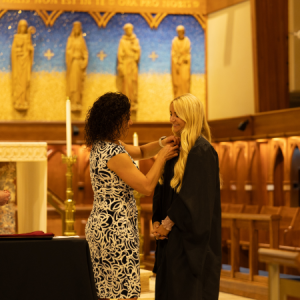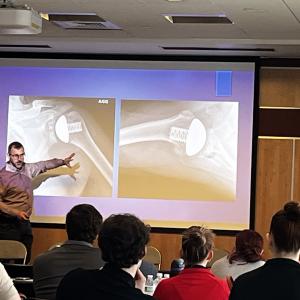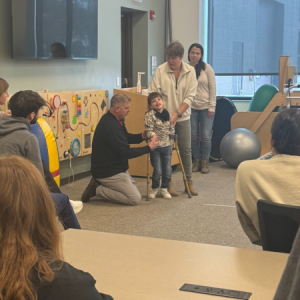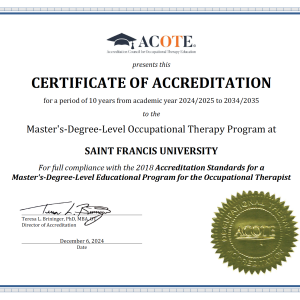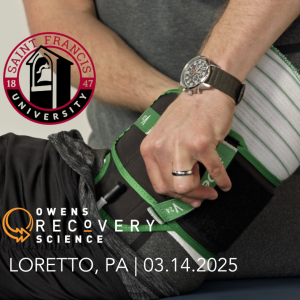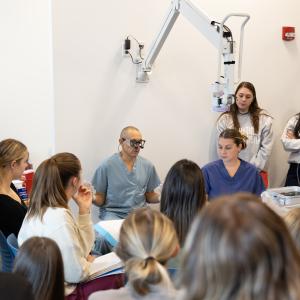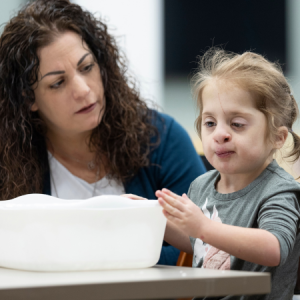
Master of Occupational Therapy (MOT)
School of Health Sciences & Education
Empower Others with your Master's Degree in Occupational Therapy from Saint Francis University
The best occupational therapists are compassionate, well-rounded, and experienced in varied specialties. The Master of Occupational Therapy (MOT) program at SFU offers a multidisciplinary approach, scholarly and fieldwork opportunities, and the expertise of practicing faculty to help you become the best occupational therapist you can be.
Flexible Learning Paths
Start as a freshman in our accelerated 3+2 Occupational Therapy program for the fastest path to your OT career, or join us as an MOT graduate student!
High-Tech & High-Touch Opportunities
Access to suitable learning spaces, faculty mentorship, and real-world opportunities allows you to put theory into practice. At SFU, we've got hands-on experiences covered. Here are a few highlights.
- Work with some of the most cutting-edge technology that occupational therapists use in clinics today, including a driving simulator, the Bioness Integrated Therapy System, 3D printers and scanners, and more.
- Join the Student Occupational Therapy Association (SOTA) and our Pi Theta Epsilon (PTE) chapter, the national occupational therapy honor society, to network and learn.
- Participate in community-engaged experiences such as Baby Day, community labs, and a backpack safety awareness campaign.
- Develop problem-solving and patient care skills in our on-campus Home Care Lab and work alongside a PA, PT, or nursing major in one of the many simulation scenarios in our Experiential Learning Commons.

Dynamic Learning Environment
Explore the field through technology-enhanced labs and classroom spaces designed specifically for OT majors.
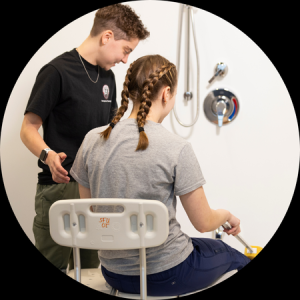
Hands-On Experience
Gain real-world experience on-campus and in various clinical settings to find your OT career fit.
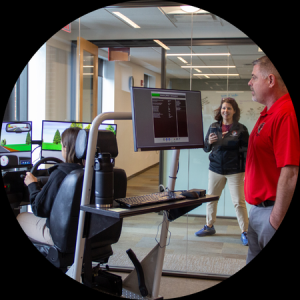
Personalized Mentorship
Dedicated faculty with clinical and research experience are here to help you in the classroom and beyond.
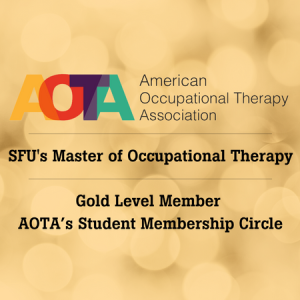
The Department of Occupational Therapy
is proud to be a Gold-Level member
of AOTA’s 2024–2025 Student Membership Circle.
Why choose SFU's MOT program?
- Tailored for Career Exploration
The Master of Occupational Therapy program at SFU is based on a multidisciplinary, holistic approach and uses ACOTE’s education standards to prepare students for careers as occupational therapists in many specializations. Fieldwork experiences in the professional phase occur in multiple settings and are designed to help students become well-rounded practitioners and find the career path they are most passionate about pursuing. - Exceptional Education/Affordable Costs
With SFU's 3+2 accelerated program you can enter the workforce and start earning a year earlier than peers in a traditional 6-year path. SFU also offers competitive graduate tuition rates. Beginning in the Summer of 2025, the professional phase of the MOT is only $917 per graduate credit. - Specialized On-Campus Facilities
Our students hone their skills in St. Margaret Hall, a brand-new facility outfitted with innovative labs and classrooms designed for OT students. Adjacent to this space is the Experiential Learning Commons (ELC), an on-campus, state-of-the-art clinical education space that supports interprofessional learning critical to healthcare professionals. - Personalized Faculty Mentorship
All of our expert OT faculty are doctorally prepared in a variety of specialties with extensive clinical and research experience. They are committed to helping you find your path through individualized mentorship and faculty-led research projects. - Excellent Job Prospects
Occupational therapy is a high-demand career! SFU's MOT students gain hands-on experience across clinical settings to build vaulable connections and find their OT career path. SFU's Career Services and their OT faculty mentors support them every step of the way. - Undergraduate & Graduate Pathways
Undergraduate applicants can be guaranteed admission into the master's program through the defined 3+2 accelerated path at SFU. There are also a limited number of graduate admissions seats open each year.
Accreditation
The Saint Francis University entry-level occupational therapy master’s degree program is accredited by the Accreditation Council for Occupational Therapy Education (ACOTE) of the American Occupational Therapy Association (AOTA), located at 7501 Wisconsin Avenue, Suite 510E, Bethesda, MD 20814. ACOTE’s telephone number, c/o AOTA is 301-652-AOTA (301-652-2682), and its web address is www.acoteonline.org.
Graduates of Saint Francis University’s MOT program are eligible to sit for the national certification for the occupational therapist administered by the National Board for Certification in Occupational Therapy (NBCOT). After successful completion of this exam, the graduate will be an Occupational Therapist, Registered (OTR).
In addition, all states require licensure in order to practice; however, state licenses are usually based on the results of the NBCOT Certification Examination.
NOTE: A felony conviction may affect a graduate’s ability to sit for the NBCOT certification examination or attain state licensure. Additional information on character review can be found at the NBCOT website. It is the responsibility of the prospective student to determine eligibility.
Students must complete 24 weeks of Level II fieldwork within 24 months following successful completion of Summer II of the Professional Phase of the program.
Graduation Rate
Program results from the National Board for Certification in Occupational Therapy (NBCOT) can be found online.
| Graduation Year | Students Entering / Graduating | Graduation Rate |
|---|---|---|
| 2024 | 37/37 | 100% |
| 2023 | 33/33 | 100% |
| 2022 | 35/33 | 94% |
| Overall Average | 105/103 | 98% |
Career Outlook in Occupational Therapy
Growth Industry: Occupational therapy is a high-demand field with varied career paths. The Bureau of Labor Statistics projects the field to grow 16% by 2029, faster than the average growth rate.
SFU Grads: Our graduates have 100% job placement rates within the first 6 months of degree completion. (University's First Destination Report)
Thanks to our multidisciplinary approach and experienced faculty, our graduates are prepared for careers as occupational therapists in any specialization. Fieldwork experiences in the professional phase occur in multiple settings to help students become well-rounded practitioners and find the career path they are most passionate about pursuing.
Our graduates have found careers as occupational therapists throughout the United States, treating patients of all ages in home health services, hospitals, schools, nursing homes, outpatient clinics, and more.
Salary Potential: $96,370 (2023 median pay, Bureau of Labor Statistics)

Experienced OT Faculty Who Love To Teach
Our Occupational Therapy faculty have expertise in telemedicine, alternative medicine, pediatrics, geriatrics, neurological rehabilitation, upper extremity orthopedic rehabilitation, industrial rehabilitation, ergonomics and injury prevention, sensory processing, cultural adaptability, therapeutic intervention, playground accessibility, and nutritional therapy. All SFU Occupational Therapy faculty are doctorally prepared.
In addition to our full-time faculty, the Master of Occupational Therapy program is enhanced by the expertise of several adjunct members, who bring valuable, real-world experience and specialized knowledge to the classroom.
Department Chair: Dr. Andrew F. Miller, OTR/L, CHT, ATC/L, CFE, afmiller@francis.edu, (814) 472-3315
Frequently Asked Questions about the OT Program at Saint Francis University
-
As an occupational therapist, your job is to help patients achieve the activities of daily living that are most important to them, like returning to hobbies, getting dressed or cooking for themselves. With a comprehensive education in our MOT program, you'll be well-prepared for a career in multiple health settings, including schools, hospitals, outpatient rehabilitation centers, skilled nursing facilities and more.
-
A Masters of Occupational Therapy degree remains the quickest way to enter the field as a fully certified occupational therapist. And with our 3+2 direct entry program – that means just one extra year of study beyond the typical 4-year bachelor’s degree path.
In October 2018, AOTA and ACOTE placed the discussed mandate to transition all programs to the doctoral level on hold, thus allowing SFU to keep the most cost-effective 5-year path into the field of occupational therapy in place.
Additionally, though the professional phase of our program begins in your fourth year, you will still be able to receive undergraduate scholarships and aid until your bachelor’s degree is conferred.
-
Absolutely. OTs have the opportunity to pursue a wide range of specializations, including areas such as:
Board Certification in Pediatrics (BCP)
Board Certification in Geriatrics (BCG)
Board Certification in Mental Health (BCMH)
Board Certification in Physical Rehabilitation (BCPR)
Specialty Certification in Driving and Community Mobility (SCDCM)
Specialty Certification in Environmental Modification (SCEM)
Specialty Certification in Feeding, Eating, and Swallowing
Specialty Certification in Low Vision (SCLV)
Specialty Certification in School Systems (SCSS)
Certified Hand Therapist
Certified Lymphedema Specialist
Assistive Technology Professional (ATP)
Certified Brain Injury Specialist (CBIS)
Certified Neurorehabilitation Specialist (CNS)
Certified Stroke Rehabilitation Specialist (CSRS)
Certified Autism Specialist (CAS)
Sensory Integration Certification (SIPT or CLASI)
Certified Aging in Place Specialist (CAPS)
Certified Dementia Practitioner (CDP)
Certified Ergonomics Assessment Specialist (CEAS)
Aquatic Therapy Certification
Pelvic Rehabilitation Practitioner Certification (PRPC)
Certified Kinesio Taping Practitioner (CKTP)
Oncology Rehabilitation Specialist
Certified Low Vision Therapist (CLVT), among others.
As an occupational therapist, your job is to help patients achieve the activities of daily living that are most important to them, like returning to hobbies, getting dressed or cooking for themselves. With a comprehensive education in our MOT program, you'll be well-prepared for a career in multiple health settings, including schools, hospitals, outpatient rehabilitation centers, skilled nursing facilities and more.
A Masters of Occupational Therapy degree remains the quickest way to enter the field as a fully certified occupational therapist. And with our 3+2 direct entry program – that means just one extra year of study beyond the typical 4-year bachelor’s degree path.
In October 2018, AOTA and ACOTE placed the discussed mandate to transition all programs to the doctoral level on hold, thus allowing SFU to keep the most cost-effective 5-year path into the field of occupational therapy in place.
Additionally, though the professional phase of our program begins in your fourth year, you will still be able to receive undergraduate scholarships and aid until your bachelor’s degree is conferred.
Absolutely. OTs have the opportunity to pursue a wide range of specializations, including areas such as:
Board Certification in Pediatrics (BCP)
Board Certification in Geriatrics (BCG)
Board Certification in Mental Health (BCMH)
Board Certification in Physical Rehabilitation (BCPR)
Specialty Certification in Driving and Community Mobility (SCDCM)
Specialty Certification in Environmental Modification (SCEM)
Specialty Certification in Feeding, Eating, and Swallowing
Specialty Certification in Low Vision (SCLV)
Specialty Certification in School Systems (SCSS)
Certified Hand Therapist
Certified Lymphedema Specialist
Assistive Technology Professional (ATP)
Certified Brain Injury Specialist (CBIS)
Certified Neurorehabilitation Specialist (CNS)
Certified Stroke Rehabilitation Specialist (CSRS)
Certified Autism Specialist (CAS)
Sensory Integration Certification (SIPT or CLASI)
Certified Aging in Place Specialist (CAPS)
Certified Dementia Practitioner (CDP)
Certified Ergonomics Assessment Specialist (CEAS)
Aquatic Therapy Certification
Pelvic Rehabilitation Practitioner Certification (PRPC)
Certified Kinesio Taping Practitioner (CKTP)
Oncology Rehabilitation Specialist
Certified Low Vision Therapist (CLVT), among others.
